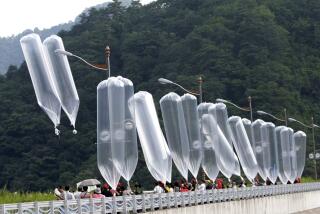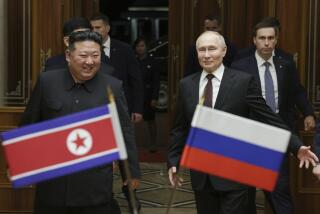Clinton Warns of U.S. Curbs on N. Korea
- Share via
PORTSMOUTH, England — President Clinton, under fire from critics who have accused him of being too soft in opposing North Korea’s purported nuclear ambitions, significantly stepped up his rhetoric Sunday, saying the United States would consider imposing sanctions without the United Nations if the Security Council proved unable to make a decision.
He also warned that North Korea would risk “certain, terrible defeat and destruction” if it retaliated.
The remarks, made in nationally televised interviews as Clinton sailed toward France for the commemoration of the D-day landing, came only a day after the President had said he did not want “a lot of saber-rattling talk over this.”
Together, the President’s comments illustrated the narrow line he and his top aides are trying to walk as they try to manage the crisis that has developed from North Korea’s refusal to allow International Atomic Energy Agency inspections of its nuclear facilities.
On the one hand, the Administration wants to counter the attacks of U.S. critics who have accused Clinton of being weak and vacillating in his foreign policy.
On Sunday, for example, Sen. John McCain of Arizona, a leading Republican foreign policy spokesman, charged the Administration with “appeasement” of the North Koreans and said Clinton was acting in the “tradition of Neville Chamberlain,” the British prime minister who surrendered Czechoslovakia to Hitler in the years before World War II. McCain made his comments on the CBS-TV program “Face the Nation.”
At the same time, Clinton and his aides want to play down the talk of war that has buzzed through Washington in recent days, fearing, among other things, that bellicose language from U.S. officials could get out of hand, potentially prompting the unpredictable North Korean leaders into a preemptive strike that could open a full-scale war.
The United States, Japan and South Korea have agreed to seek sanctions against North Korea in the wake of the declaration by the IAEA that North Korean actions had made it impossible to verify whether or not Pyongyang had diverted weapons-grade plutonium from an experimental nuclear reactor. Such acts by North Korea would violate the Nuclear Non-Proliferation Treaty.
In the past, North Korean spokesmen have said any sanctions would be considered an act of war, but U.S. officials have dismissed those statements as bluster. Clinton, interviewed by ABC News, said he did not believe that the North Koreans would carry through on those threats.
“I don’t think that they would risk the certain, terrible defeat and destruction that would occur if they did that,” he said.
But while the Administration proceeds to seek sanctions from the United Nations, senior U.S. officials, worried that China will veto any sanctions resolution, have begun to explore additional avenues to thwart the Pyongyang regime.
Defense Secretary William J. Perry said Sunday on NBC-TV’s “Meet the Press” program that it is “entirely possible” that Beijing would block a U.N. Security Council resolution against North Korea.
And Clinton, interviewed by NBC News, said that while he still hopes support from China and Russia will allow the United Nations to move forward, “if it doesn’t we’ll have to look at who else wants to do it, and what else we can do.” Sanctions could be imposed by a “so-called coalition of the willing,” Clinton added.
Perry and other senior officials here for ceremonies commemorating the 50th anniversary of D-day insisted that the Administration will continue to work through the United Nations and privately with Beijing to try to reach a consensus on a U.N. sanctions resolution.
But officials noted Beijing’s continued reticence about punishing--and possibly provoking--its Communist neighbor and important trading partner.
Other officials caution that the Administration sees sanctions as a difficult and potentially dangerous step and would prefer to compel Pyongyang to accept international oversight of its nuclear facilities through less drastic means.
But North Korea said Sunday that it will not bow to outside pressure to open up its nuclear program, which it insists is peaceful.
“We do not want confrontation,” said the North Korean Workers Party daily Rodong Sinmun, according to the official Korean Central News Agency monitored in Tokyo. “But we do not have the intention to meet an unjustifiable demand under continued pressure and cannot tolerate our sovereignty encroached upon.”
Clinton and Perry tried to downplay talk of possible military confrontation with North Korea over the nuclear issue.
“I do not think we are facing imminent danger,” Perry said. “I think this whole talk of war is quite premature, and it’s creating a sort of hysteria which is not appropriate to the present situation.”
At the same time, both men also sought to rebut criticism that the Administration had not done enough to prepare for the defense of South Korea and the more than 30,000 U.S. troops stationed there.
“Certainly we’re not seeking, we will not provoke, a war,” Perry said. “But at the same time, we will not invite a war by not being ready. . . . We have been building up our forces over the last six months. We will continue to develop them as necessary as the situation on the ground warrants.”
Perry said the United States and South Korea believe that their military forces are adequate to deter an attack from the North. But he said that if North Korea moves its forces closer to the border or makes other threatening moves, “we will take whatever actions are necessary.”
As Administration officials tried to calibrate their public message, they came in for continued heavy criticism at home. In addition to McCain, Former Secretary of State James A. Baker III criticized the Administration’s handling of the Korean crisis.
“What we probably should have done a while ago is to make it clear to the North Koreans that we’re serious about this, that when we say something, we mean it,” said Baker, who is a potential Republican candidate for President in 1996. He made his comments on “Meet the Press.”
Baker said the Administration’s efforts to negotiate with Pyongyang are counterproductive and make the United States and the United Nations look weak.
Baker did, however, endorse Perry’s suggestion that the United States would pursue sanctions unilaterally. He said that nearly all Asian nations are unanimous in not wanting nuclear weaponry on the Korean peninsula.
“I think we could bring to bear a significant international coalition and international support behind those sanctions,” Baker said.
Broder reported from Portsmouth and Lauter from Washington.
More to Read
Sign up for Essential California
The most important California stories and recommendations in your inbox every morning.
You may occasionally receive promotional content from the Los Angeles Times.














